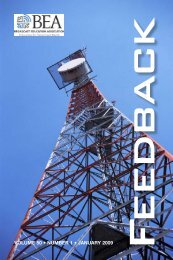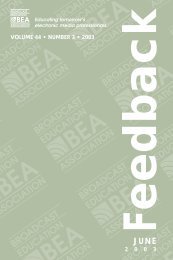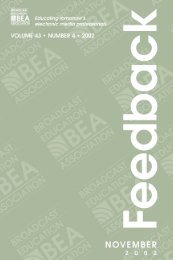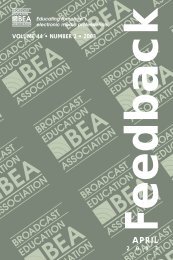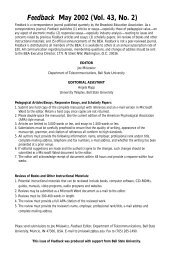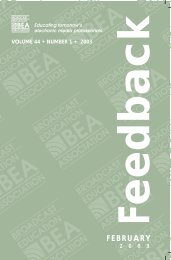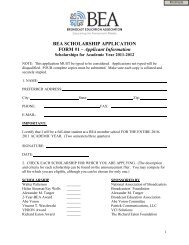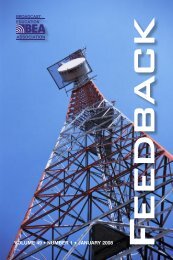PLANNING FOR GROWTH IN YEARS OF RESTRICTED RESOURCES
Feedback September 2003 - Broadcast Education Association
Feedback September 2003 - Broadcast Education Association
You also want an ePaper? Increase the reach of your titles
YUMPU automatically turns print PDFs into web optimized ePapers that Google loves.
One radio station manager in North Carolina stressed the December 2000 changein the law, and pointed out that Pat Buchanan and some House candidates flooded thenon-commercial airwaves in previous election cycles. A television manager echoed thatsentiment and relayed the story of a local Buchanan organizer in 2000 demanding thestation run a 73-minute piece produced by the Buchanan campaign. Station lawyerseventually reached an agreement for a two-minute statement in prime time.A handful of respondents took the opportunity to share other unusual candidaterequests. A radio manager from Oklahoma City revealed the failed attempt of onecandidate “to purchase an hour of air time for an infomercial.” An upstate New Yorkradio station reported it was “threatened with an ‘occupation’ by an environmentalistwho had declared himself a write-in challenger to our otherwise unopposedcongressman.” Another New York station reported a candidate wanted “emergency” airtime.A respondent from Kansas City noted that some candidates who owned businessesnamed after themselves were getting “back door underwriting” by obtaining businessunderwriting credits during election cycles. Another respondent noted that somecandidates make certain their membership renewal is announced during fallmembership acknowledgements. A radio manager in Fresno was obliged to air acandidate message because the candidate’s opponent had been heard on the stationduring a public service announcement. A radio station in Grand Rapids, Michigan,allowed a candidate for state office and his opponent to speak during a fall fundraiser, but neither could discuss the campaign, only public radio.Cash-starved non-commercial stations do take a second look at the prospect ofcandidate money for underwriting. One Alabama radio manager wrote, “I’d be temptedto, but No!” A radio manager in Indiana declared, “There is too much money beingmade not to try to be a piece of the marketing/imaging campaign.” One Ohio radiomanager accepts candidate underwriting, but only if the words do not promote thecandidate and only say something like “reminding listeners that Tuesday is electionday.”Stations typically mentioned forums and public affairs interviews, but someventured into new variations such as Spanish-language call-in programs or websiteswith candidate information. Many station managers report they took the initiativeregarding contacting candidates, notwaiting for candidates to request time. WXXI, for example, presented two-minuteunedited candidate statements. Clearly, however, the legal changes in late 2000 had aneffect. While one still can find stations presenting candidate-generated material, moststations either offer no candidate-related time or only present forums, news coverage,and call-in programs.Appendix:1) Have federal candidates (U.S. Senate or U.S. House) approached your noncommercial station foraccess or time regarding the 2002 primary or general election campaigns? Yes No2) Did federal candidates (Presidential, U.S. Senate, U.S. House) approach your noncommercialstation for access or time regarding the 2000 primary or general election campaigns? Yes NoBEA—Educating tomorrow’s electronic media professionals 46



